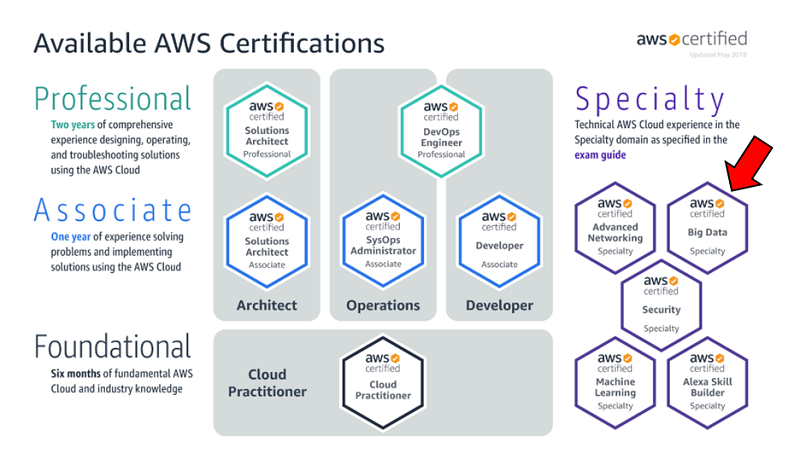AWS Certifications: A Complete Guide

In today’s rapidly evolving technology landscape, Amazon Web Services (AWS) remains one of the biggest players in the cloud computing industry. For most IT pros, AWS certifications have become a crucial stepping stone for career advancement. These certifications validate professionals’ expertise with AWS services and indicate their ability to design, deploy, and manage applications on the AWS platform. In this article, I will give you a comprehensive overview of AWS certifications so you can identify which ones are the best to help you advance your IT Pro career.
What are AWS Certifications?
AWS Certifications are industry-recognized credentials that help to assess someone’s expertise with Amazon Web Services (AWS). These certifications help to demonstrate proficiency in various AWS tools and services, AWS architecture design, and the deployment and management of AWS applications.
As of today, AWS certifications play a vital role in career advancement as organizations all around the globe are increasingly relying on AWS for their cloud infrastructure needs. By staying up-to-date with the latest AWS technologies and becoming certified, you can enhance your credibility and competitiveness in the dynamic world of cloud computing.
What are the benefits of being AWS Certified?
Getting certified can help you boost your career growth while helping you grow your skill set. Here are the main benefits of getting AWS certified.
Career opportunities
AWS certifications may significantly enhance your career prospects by opening the doors to a wide range of job opportunities. Employers actively seek certified AWS professionals to grow their businesses, and for you this results in increased job prospects and higher earnings potential.
Overall, AWS certifications can help you establish strong credibility and recognition in the industry. Employers and peers recognize the rigorous training and expertise demonstrated by certified professionals, leading to greater trust in your abilities. The impact on your professional reputation can be quite significant.
AWS certifications are globally recognized and respected within the IT industry. Holding an AWS certification demonstrates your commitment to continuous learning and professional growth. Getting certified will help you to stand out among your peers while increasing your chances of securing prestigious projects and promotions.
Enhancing your technical skills
Through the certification process, you’ll gain in-depth knowledge of several AWS services, architecture best practices, as well as hands-on experience with real-world scenarios. You’ll be learning a skill set for designing, deploying, and managing scalable and secure cloud solutions.
Access to exclusive resources
AWS certifications provide access to a wide range of exclusive resources including official documentation, training materials, webinars, and a vibrant community of certified professionals. These resources and networking opportunities enable continuous learning, and they’ll help you to stay updated with the latest AWS innovations.

How can you become AWS certified?
Becoming AWS certified requires a combination of dedication, knowledge, experience, and preparation. Here’s a general guide that covers the different aspects you need to take into consideration to become AWS certified.
Knowledge and experience
While most of the AWS certifications do not have strict prerequisites such as an academic background, it’s recommended to have some hands-on experience with AWS services before you start. Familiarity with cloud computing concepts, architectural best practices, and proficiency in any programming language can be advantageous, and it can definitely help you to excel throughout the training process.
Exam preparation
To prepare for AWS certifications, it’s crucial to study the exam guide, review official documentation, and leverage training resources. That includes AWS training courses, practice exams, and study materials available through the AWS Training and Certification website. Hands-on experience and practical application of AWS services can also be very beneficial.
Exam duration and cost
AWS certification exams typically range from 80 to 180 minutes depending on the certification level and specific exam. The cost varies by certification, ranging from $100 to $300 USD per exam attempt. It’s worth noting that exam prices are subject to change and vary widely, so it’s recommended to verify the latest pricing on the official AWS Training and Certification website.
Time investment
The time investment required to become AWS certified varies based on individual circumstances, including prior experience and the amount of time you can dedicate to studying. Some individuals may achieve certification within a few months, while others may take longer depending on their pace and availability.
AWS Certification paths: An overview
AWS offers a very comprehensive certification program designed to validate professionals’ expertise in various areas of cloud computing. When broadly classified, the AWS cloud certification paths consist of foundational level certifications, associate level certifications, professional level certifications, and specialist level certifications. And there are several certifications offered within these paths.

Let’s dig into AWS certification paths, starting with foundational-level certifications.
Foundational level certifications
AWS Foundational level certifications serve as entry points for individuals new to AWS. These certifications enable users to develop a solid understanding of core AWS services. They cover a range of topics, including security, data protection, architecture, pricing, and billing concepts.
These certifications serve as stepping stones for advancing in AWS certification paths, opening up opportunities for further professional growth and specialization.
AWS Certified Cloud Practitioner Certification
The AWS Certified Cloud Practitioner certification focuses on providing you with a comprehensive understanding of AWS cloud concepts. It aims to equip candidates with the necessary knowledge for navigating the AWS cloud platform, understanding its value proposition, and participating in discussions regarding AWS cloud solutions. By obtaining this certification, you can demonstrate your knowledge of the AWS cloud and its practical applications across different industries.
Associate level certifications
Associate-level certifications are aimed at individuals with some experience working with AWS. These certifications include AWS Certified Solutions Architect – Associate, AWS Certified Developer – Associate, and AWS Certified SysOps Administrator – Associate. Each of these certifications focuses on specific roles and validates skills in designing, developing, and operating applications on AWS.
AWS Certified Solutions Architect
The AWS Certified Solutions Architect – Associate certification focuses on designing and deploying scalable, cost-effective, and secure applications on AWS. It covers the best practices for designing and managing robust IT architectures, helping you choose the right AWS services for your projects along the way.
AWS Certified Developer
The AWS Certified Developer – Associate certification validates your expertise in developing and maintaining different types of applications on the AWS platform. It focuses on core AWS services, application life cycle and deployment, and troubleshooting using AWS technologies. Ultimately, this certification enables professionals to build scalable and resilient applications across different platforms such as web and mobile.
AWS Certified SysOps Administrator
The AWS Certified SysOps Administrator – Associate certification helps IT pros to develop the required skills for managing IT environments with AWS services. It includes topics such as system operations, deployment and management of applications, and more to ensure smooth and efficient operations on the AWS platform.
Professional level certifications
As their name suggests, these professional-level certifications are intended for experienced professionals who already have in-depth knowledge of AWS services and extensive hands-on experience with them. These certifications assess the ability to design and manage complex architectures that rely on AWS services.
AWS Certified Solutions Architect – Professional certification
The AWS Certified Solutions Architect – Professional certification targets experienced software architects who specialize in designing and deploying complex AWS solutions. It assesses the ability to design and manage architectures that ensure scalability, security, and reliability, all while taking cost optimization into account.
AWS Certified DevOps Engineer – Professional certification
The AWS Certified DevOps Engineer – Professional certification focuses on the advanced technical skills required for implementing and managing continuous integration and continuous delivery (CI/CD) systems on AWS. It focuses on deploying, operating, and managing applications on the AWS infrastructure, automating security controls, and implementing monitoring and logging systems to support DevOps practices.

AWS Speciality Level certifications
AWS Specialty level certifications are considered to be the pinnacle of expertise in specific domains that are offered for certification. They are designed for professionals aiming to master advanced AWS skills, and they validate deep knowledge and practical proficiency.
Although the requirements vary for different AWS certifications, it is often recommended to have the AWS Certified Cloud Practitioner or AWS Certified Solutions Architect – Associate certification as a foundation before pursuing a Specialty certification. You can find below the core AWS Speciality level certifications that are currently available.
AWS Certified Security – Specialty
The AWS Certified Security – Specialty certification allows professionals to gain a comprehensive understanding of how to secure AWS environments. It has a strong emphasis on active threat detection and mitigation techniques, and it validates your expertise in implementing robust security controls, incident response, and compliance frameworks. With this certification, individuals can demonstrate their ability to protect data, applications, and infrastructure in the cloud, which is especially important for organizations facing evolving cyber threats.
AWS Certified Machine Learning – Specialty
The AWS Certified Machine Learning – Specialty certification allows IT pros to get advanced knowledge and skills in various machine learning technologies and their implementation within the AWS ecosystem. It focuses on the active implementation of ML solutions for various use cases including data pre-processing, model selection, and optimization. By obtaining this certification, individuals can demonstrate their expertise in designing and deploying scalable, cost-effective, and high-performing ML models.
AWS Certified Data Analytics – Specialty
The AWS Certified Data Analytics – Specialty certification focuses on data analysis and visualization services. If you’re a data specialist, it will help you become an expert with AWS data analysis services and enable you to make data-driven decisions for your organization.
AWS Certified Database – Specialty
AWS offers several databases to handle structured, semi-structured, and unstructured data. The AWS Certified Database – Specialty certification enables professionals to design, deploy, and manage various AWS database solutions. This certification will also help you learn how to implement AWS database technologies while ensuring optimal performance and data integrity.
AWS Certified Advanced Networking – Specialty
The AWS Certified Advanced Networking – Specialty certification will train professionals to design and implement advanced networking architectures across different AWS solutions and services. It focuses on network designing, optimization, and routing techniques to improve network efficiency and security.
AWS Certified Alexa Skill Builder – Specialty
Alexa is Amazon’s proprietary voice-controlled virtual assistant that now powers a growing number of first-party and third-party devices. The AWS Certified Alexa Skill Builder – Specialty certification specializes in building new Alexa skills, testing them, and deploying them on different devices. With this certification, professionals can demonstrate their ability to create innovative voice-based applications and services leveraging the power of Alexa and AWS.
AWS Certified IoT – Specialty
The AWS Certified IoT – Specialty certification validates professionals’ expertise in designing and implementing performant, secure, and scalable IoT solutions using AWS services. This certification enables professionals to gain actionable knowledge of AWS IoT services so they can develop innovative and reliable IoT architectures.
Which is the best AWS certification for you?
For an IT pro, having so many AWS certification options can certainly be overwhelming. However, let me help you with the major factors to consider when choosing an AWS certification.
Experience and technical background
First of all, you should assess your experience and technical skills to choose an AWS certification that matches your current proficiency level. Of course, you should also take into account your personal interests and career goals when selecting an AWS certification.
Ideally, you should opt for a certification that aligns with your passions and aspirations. This will not only make the certification process more enjoyable for you, but it will also pave the way for long-term success.
Industry demand and job market trends
If getting any AWS certification should help you advance in your career, you also need to explore the demand for different AWS certifications in your industry and stay updated on job market trends. Identifying certifications that are in high demand will ensure better career prospects and increased employability for you.
Time and financial investment required
Lastly, you should take into account the time and financial commitment required for preparing for each AWS certification. Find a balance that suits your schedule and budget so you can dedicate the necessary resources for successful certification achievement.

Which AWS Certifications are in most demand?
The demand for AWS certifications may vary based on industry trends and your specific location. Keeping up with the latest advancements and emerging technologies in the AWS ecosystem can help you identify and pursue the certifications that align best with your career goals.
However, there are some AWS certifications that are likely going to help you make a career change or land a job more easily. The most in-demand certifications are usually AWS Certified Solutions Architect – Associate, AWS Certified Developer – Associate, AWS Certified SysOps Administrator – Associate, AWS Certified Cloud Practitioner, and AWS Certified Solutions Architect – Professional. Scroll up to get more details about these certifications
How to prepare for AWS certifications and maintain them over time
The journey from choosing an AWS certification to achieving it and then maintaining it can look quite intimidating. However, breaking down this process into simple steps should help you realize that it’s not as hard as it seems.
Step 1: Identify the right certification path
The first step in your AWS certification process is to choose an AWS certification that aligns with your career goals. If the information in this article isn’t enough, you can explore the available certification paths on the AWS Training and Certification website.
Step 2: Study the exam guide
You can familiarize yourself with the exam guide specific to your chosen certification. This guide outlines the topics covered by your certification and provides guidance on what to study. You can find the official AWS Exam Guides on this page.
Step 3: Use the AWS training resources
As you’re studying to get your certification, you should take advantage of all the training resources provided by Amazon. You can access AWS training and certification courses including digital training and instructor-led classes to gain in-depth knowledge of AWS services and best practices. You can check out the available training options on the AWS Training and Certification website.
Step 4: Get some practice with hands-on labs
It’s important to enhance your practical skills with hands-on labs and exercises. AWS offers free practice labs and scenarios through the AWS Training and Certification portal. Engaging in real-world simulations will definitely help you gain confidence in applying your knowledge. You access Amazon’s hands-on labs on this page.
Step 5: Take practice exams
Test your knowledge and assess your readiness by taking practice exams. AWS provides sample questions and practice exams to familiarize yourself with the exam format and identify areas that require further study. You can access practice exams on the AWS Certification Practice Exams page.
Step 6: Join the AWS community
Connecting with fellow AWS professionals through the AWS Community can really help you throughout your certification journey. Participate in forums, discussion boards, and local meetups to share knowledge and experiences. You can engage with the AWS Community by visiting the AWS Community page.
Step 7: Maintaining your Certificates
After successfully passing the exam to get your AWS certification, you’ll need to keep an eye on the AWS Certification Renewal page to understand the requirements for maintaining your certification. It’s important to fulfill them within the specified timeframes.
Moreover, I highly recommend staying up-to-date with the ever-changing AWS technologies. To do that, you can participate in events like AWS Re:Invent, webinars, and several training sessions that AWS offers.
AWS certifications are really valuable
AWS certifications hold tremendous value in today’s cloud landscape. These certificates demonstrate professionals’ expertise in AWS services and provide a competitive edge in the job market. By obtaining AWS certifications, you can showcase your ability to design, deploy, and manage AWS solutions to your potential employers.
Table of contents
- What are AWS Certifications?
- What are the benefits of being AWS Certified?
- How can you become AWS certified?
- AWS Certification paths: An overview
- Foundational level certifications
- Associate level certifications
- Professional level certifications
- AWS Speciality Level certifications
- Which is the best AWS certification for you?
- Which AWS Certifications are in most demand?
- How to prepare for AWS certifications and maintain them over time
- AWS certifications are really valuable



